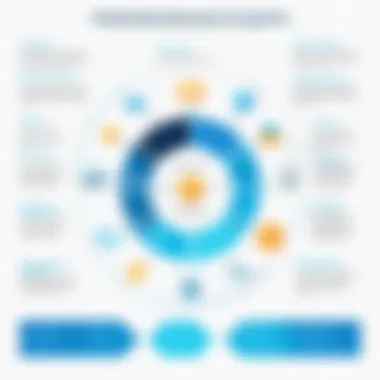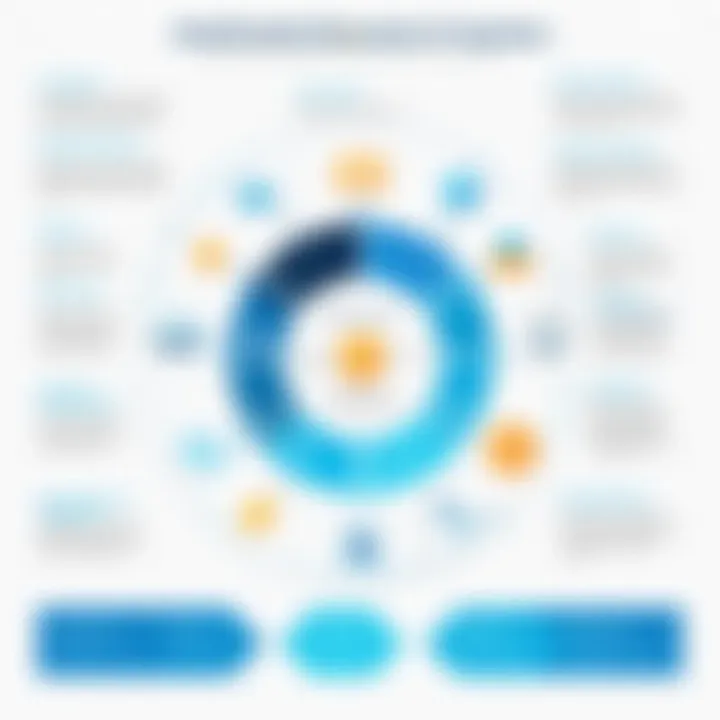Navigating Modern Reservation Platforms Effectively


Intro
In a world that's moving faster than a cat on a hot tin roof, reservation platforms have become essential tools in our digital toolkit. These platforms have changed how businesses, big and small, operate day-to-day. They allow everything from booking a table at your favorite restaurant to securing a flight halfway across the globe. This guide aims to break down what makes these platforms tick, providing decision-makers with the insights needed to select the right tool for their specific needs.
With tech-savvy users expecting streamlined experiences, understanding the features and functionality of modern reservation platforms is non-negotiable. As we wade into the intricate waters of this subject, we'll shine a light on key functionalities, explore integration capabilities, weigh the pros and cons, and look ahead to future trends shaping reservation technology. Let's dive deep into the ocean of possibilities that these platforms offer.
Preamble to Reservation Platforms
It’s hard to imagine our daily lives without the convenience of reservation platforms these days. They’ve become the backbone for many industries, from travel to healthcare, streamlining processes that used to take a mountain of paperwork and time. In today’s fast-paced world, the importance of these platforms cannot be overstated. They’re not just about booking a hotel room or scheduling a doctor’s appointment; they represent a significant evolution in how businesses interact with their customers.
When one takes a closer look at the essence of reservation platforms, it becomes clear they are not merely tools but rather gateways to enhancing customer experiences. With these systems, businesses can offer real-time interaction, which is nearly expected by consumers now. No longer do clients have to wait for a confirmation email or sift through endless phone menus; instant access to availability is paramount.
Defining Reservation Platforms
At its core, a reservation platform is a software solution designed to facilitate the booking and management of various services. These services can range widely, encompassing travel accommodations, dining reservations, event ticketing, and healthcare appointments, to name a few. Essentially, these systems serve as a hub where both clients and businesses can synchronize their needs efficiently.
A properly designed platform typically provides features like user-friendly interfaces, immediate booking confirmations, and easy access to information about services. The role of reservation platforms transcends mere convenience; they promote operational efficiency, reduce human error, and ultimately enhance customer satisfaction. In the modern marketplace, it's clear that businesses integrating such solutions gain a competitive edge.
Historical Context and Development
To truly appreciate the significance of reservation platforms, it's insightful to explore their historical trajectory. The concept of reservations dates back to the early 20th century, primarily within the hospitality industry. Before digital advances, reservations were usually made through phone calls, letters, or even telegrams, a system that was meticulously labor-intensive.
With the advent of the internet in the late 20th century, the landscape began to shift dramatically. The emergence of online travel agencies such as Expedia and Booking.com revolutionized the way consumers booked travel accommodations. These platforms not only centralized information but also enabled customers to easily compare prices and availability, changing the game for travelers and hospitality providers alike.
Over the past two decades, we've seen a surge in the sophistication of these systems. Cloud-based technologies have allowed for integration with other business functions, data analytics to understand customer preferences better, and mobile accessibility that meets the needs of an increasingly on-the-go consumer base. Each upgrade has built upon the previous, always with an eye toward improving user experience and security.
Indeed, looking through this historical lens reveals much about the current capabilities and ongoing evolution of reservation platforms. As we move further into the digital age, understanding this context can illuminate the path forward for decision-makers in fields as diverse as travel, healthcare, and event management.
Essential Features of Reservation Platforms
When one delves into the realm of reservation platforms, it becomes clear that the effectiveness of these systems lies in their foundational features. In today's fast-paced business world, especially for sectors like hospitality, healthcare, and events, the right tools can make or break the operational efficiency. That’s why understanding these essential features is not just beneficial, but necessary for decision makers who want their business to thrive.
User Interface and Experience
In the digital age, first impressions matter; hence the user interface (UI) is a key aspect of any reservation platform. A well-designed UI ensures that users, whether they are customers or business operators, can navigate the system with ease. Something as straightforward as button placement or color schemes can influence user satisfaction immensely.
Moreover, the user experience (UX) extends beyond mere design. An intuitive flow can minimize friction points that users often encounter during booking processes. For instance, a seamless booking experience could significantly reduce cart abandonment rates, thus enhancing overall revenue. Moreover, customizing aspects like language, content, or even layout can make the system more relatable to distinct user groups, widening its appeal.
"An intuitive interface enhances user satisfaction and boosts retention in the long run."
Payment Processing and Security
Money matters, and in the realm of reservation platforms, payment processing provides the lifeblood for transactions. Security is paramount; platforms must employ stringent protocols to safeguard sensitive information. Factors such as SSL certificates and PCI compliance are often non-negotiable elements that reassure users their financial details are in safe hands.
Additionally, a variety of payment options is crucial. Customers today are looking for flexibility—whether it’s credit cards, mobile wallets, or even cryptocurrency. Being able to offer these alternatives can lend a competitive edge. It’s not just about processing payments; it’s about building trust through transparent transactions and clear return policies. If a system does not prioritize security, it risks losing considerable business.
Real-Time Availability and Booking Management
The capability to manage bookings in real-time cannot be overstated. Businesses must often juggle multiple reservations across various channels; incorporating real-time availability ensures that double bookings and overbookings become problems of the past. Imagine a hotel room that is booked seven different times—chaos ensues. Instead, effective management keeps the operational core smooth and efficient.
Furthermore, this capability can be expanded to notify users about changes in availability, cancellations, or modifications instantly, enhancing user engagement and satisfaction. Automated confirmations remind customers of their plans while freeing up resources for staff to concentrate on more strategic tasks.
Types of Reservation Platforms
Understanding the various types of reservation platforms is critical in today’s tech landscape. Each platform reflects the nuances of the industries they serve, tailoring solutions to meet specific challenges. Businesses need to understand these distinctions to make informed decisions when choosing tools that align with their unique requirements. Ignoring the differences might lead to inefficiencies and lost opportunities. The platforms vary significantly in functionality, audience, and integration capabilities, making it essential to grasp what each offers and when to deploy them appropriately.
Hospitality and Travel Industry Solutions


Hospitality and travel industry solutions are specifically designed to handle the intricate needs of hotels, resorts, airlines, and travel agencies. These platforms facilitate seamless booking, pricing management, and customer relationship management. For instance, systems like Booking.com and Expedia allow users to check real-time availability, book accommodation, and make changes on the fly, which can be vital during high season when demand spikes.
Benefits of Hospitality Solutions
- Dynamic Pricing: These systems often include sophisticated algorithms that adjust prices based on demand, competition, and occupancy rates.
- Comprehensive User Profiles: They can track customer preferences, enabling personalized marketing and enhanced service.
- Integrated Reviews and Feedback: Users often get insights from other travelers, helping them make better choices.
The significance of these platforms is clear: they transform how businesses engage with customers, potentially increasing booking rates and customer satisfaction.
Event Management Systems
Event management systems bring a different flavor to the table. These specialized platforms cater to the planning and executing of various events, including conferences, weddings, and corporate gatherings. Examples like Eventbrite and Cvent allow organizers to set up registrations, manage ticketing, and monitor attendee engagement.
Key Considerations for Event Platforms
- Scalability: They should cater to small meetings and large conferences alike, accommodating a range of event sizes.
- Analytics and Reporting: The ability to gather data for future planning is vital, giving organizers insights into what works or needs changing.
- Networking Facilitation: Some platforms even provide features to connect attendees, offering opportunities for collaboration and networking.
The adaptability of these platforms plays a significant role in ensuring events run smoothly, allowing for adjustments in real-time as conditions change.
Healthcare Scheduling Tools
Healthcare scheduling tools hold immense value, especially in the wake of recent global health crises. Tools like Zocdoc or Kyruus address the need for efficient appointment scheduling, patient management, and follow-up care tracking. These tools ensure that healthcare providers can optimize their time while offering patients ease of access.
Benefits of Healthcare Scheduling
- Automated Reminders: They can help minimize no-shows by sending reminders to patients, keeping appointments on everyone’s radar.
- Integration with EMRs: Many platforms integrate with electronic medical records systems, simplifying administrative tasks for healthcare professionals.
- Patient Engagement: Providing online booking not only enhances patient satisfaction but also streamlines the workflow of a medical practice.
Overall, the crucial role of scheduling tools in healthcare cannot be overstated; they directly impact patient care and operational efficiency.
Remember, the right reservation platform can make or break business efficiency. Investing the time to choose wisely pays off in the long run.
Integrating Reservation Platforms with Existing Systems
Integrating reservation platforms with existing systems is paramount for businesses aiming to streamline their operations. The ability to mesh new technology with established workflows can lead to improved efficiency, better data management, and enhanced customer experiences. In a world where speed and convenience reign supreme, having a seamless integration becomes not just a luxury, but a necessity.
By ensuring that reservation platforms effectively connect with tools like Customer Relationship Management (CRM) systems, Enterprise Resource Planning (ERP) solutions, and even marketing tools, companies can transform their reservation processes into cohesive experiences. This integration facilitates the easy flow of information between systems, which is crucial for maintaining accurate records and providing up-to-date services.
APIs and Data Integration
APIs, or Application Programming Interfaces, play a significant role in this integration puzzle. They act as the bridges that allow disparate systems to communicate. Think of APIs as translators; they enable data to move smoothly from one application to another without the hassle of manual entry. This not only saves time but minimizes human error, which can be detrimental in industries where accuracy is paramount.
The integration involves several layers:
- Data Synchronization: APIs ensure that information, be it customerinfo, reservations, or inventory levels, is updated in real time across platforms.
- User-Friendly Interfaces: A solid API allows for an intuitive interface, making it easier for users to navigate through different systems efficiently.
- Cost Efficiency: Investing in good APIs can significantly reduce operational costs in the long run by optimizing workflows and saving on labor costs.
"In the digital age, integration isn’t just beneficial; it’s essential for staying competitive."
As businesses leverage APIs to connect reservation platforms with existing systems, they open the door to a wealth of opportunities that lay in better customer engagement, data-driven decision-making, and ultimately, improved service delivery.
Challenges in Integration
Integration of reservation platforms with existing systems is often fraught with challenges. While the upside is clear, the path to achieving seamless integration is not without its hurdles.
Some common challenges include:
- Compatibility Issues: Different systems may run on varying protocols and formats, making some interfaces difficult to integrate. This can necessitate additional development resources.
- Data Security Concerns: Linking different systems raises concerns about data security. Businesses must ensure that sensitive information is protected during transfer to avoid data breaches.
- Cost of Implementation: Custom integrations can be costly and may not align with some businesses' budgets. The need for experienced developers can further inflate these costs.
- Training Needs: Staff may require adequate training to adapt to new systems, which can disrupt existing workflows during the transition phase.
On the whole, while integrating reservation platforms with existing systems can propel businesses forward, decision-makers must weigh these challenges and devise strategies to mitigate them. As the digital landscape evolves, so too must the tactics industries employ to navigate their integration journeys successfully.
Evaluating Reservation Platforms: Pros and Cons


When it comes to selecting a reservation platform, understanding the advantages and disadvantages is crucial. In today’s fiercely competitive landscape, the right system can provide a significant edge. This section dives into the core benefits that come with these platforms as well as the potential roadblocks. Keeping an eye on these facets holds consequences that can resonate across various sectors.
Advantages of Using a Reservation Platform
Reservation platforms are increasingly pivotal in ensuring operational efficiency and enhancing customer satisfaction. Here are some key advantages:
- Streamlined Processes: By automating booking and scheduling processes, companies can save time and reduce human error. For instance, a hotel can manage room inventory without constantly checking physical records.
- Improved Customer Experience: Many platforms have user-friendly interfaces that simplify navigation and reduce friction during the booking process. When a customer can easily make a reservation, they're more likely to return.
- Accessibility: Modern platforms allow access from multiple devices, including mobile phones and tablets. This means that both businesses and customers can interact with the reservation system at their convenience, and 24/7 availability becomes a reality.
- Comprehensive Data Collection: Advanced reporting features provide insights into customer behavior and preferences. This data can help businesses tailor marketing strategies and improve services based on real-time feedback.
- Integration with Other Tools: Many reservation systems integrate nicely with CRM or accounting software, leading to a seamless workflow. This reduces barriers between different functionalities within the business.
In summary, these advantages can enhance operational efficiency while making the entire booking experience more pleasant for customers. Every business sector, whether hospitality, healthcare, or event planning, can reap these benefits.
Potential Drawbacks and Limitations
While reservation platforms undoubtedly offer several advantages, they also come with their own set of challenges. It's wise for businesses to be aware of these before making a commitment:
- Dependence on Technology: With so much reliance on digital platforms, technical glitches can lead to chaos. If the platform goes down, so does the ability to take reservations securely.
- Cost Considerations: Many platforms charge fees that might add up significantly over time. Especially for small businesses, budget constraints may limit options.
- Steep Learning Curve: Some platforms can be complex. Employees might need training, which could lead to a temporary loss in productivity during the transition.
- Limited Customization: Not every platform provides the level of customization businesses seek. Some solutions might be based on a one-size-fits-all approach, diminishing the unique value that each business can offer.
- Data Security Concerns: With any online system, there's always a risk of data breaches. Handling sensitive customer information demands stringent security measures to avoid exposing the business to legal risks.
Ultimately, weighing the pros and cons is fundamental. Every organization must assess whether the benefits of adopting a reservation platform outweigh the potential setbacks in their specific context.
"The right reservation platform can be the backbone of an efficient operation, but careful evaluation prevents costly missteps."
Navigating these considerations can be pivotal in making informed choices as technology continues to evolve.
User Experiences and Case Studies
When we talk about reservation platforms, it's crucial not to overlook how real users engage with these systems. User experiences and case studies provide invaluable insight into the practical applications and the actual impact these tools have on day-to-day operations. They shed light on the nuances of usability, the effectiveness of features, and the overall satisfaction of both businesses and their clients.
A well-documented user experience showcases the advantages of a particular platform, illustrating how functionality translates to efficiency in the field. Additionally, case studies highlight specific implementations within different sectors, showcasing both triumphs and challenges. These narratives can inform potential adopters, helping them evaluate which platforms might meet their needs best. Furthermore, insights from actual users can often reveal hidden efficiencies and best practices that aren't immediately visible through marketing materials.
Case Study: Hospitality Sector Implementation
In the bustling world of hospitality, the right reservation platform can mean the difference between a fully booked hotel and empty rooms. One standout example is Hilton Worldwide’s adoption of the Onity system for hotel management. This platform offered Hilton the capability to streamline booking while managing room availability in real-time. By integrating this system, they were able to reduce overbookings and enhance customer satisfaction.
The benefits didn’t stop at just operational efficiency. According to a study conducted by the Cornell University School of Hotel Administration, hotels leveraging modern reservation platforms observed a significant increase in repeat bookings. The ease of use provided by Onity allowed guests to secure their stays with minimal hassle. Notably, the implementation of personalized offers through their platform led to a measurable uptick in engagement—over 30% of customers utilized tailored promotions.
Moreover, challenges arose as well. Not every hotel staff member initially embraced the new technology, leading to a learning curve that required focused training sessions. Hilton addressed this by rolling out change management strategies, which included workshops and user feedback sessions to refine their approach.
Overall, Hilton's experience underlines how tailored implementation and staff training are as critical as the technology itself.
Case Study: Healthcare Scheduling
The healthcare sector also faces unique challenges with scheduling and reservations. A prime case is the integration of the QGenda platform within various healthcare facilities like Emory Healthcare. This platform specializes in managing provider schedules, patient bookings, and operational workflows.
Before adopting QGenda, Emory faced incessant issues with double-booked appointment slots and a lack of visibility into physician availability. The platform allowed them to consolidate various scheduling processes into a singular, integrated solution. As a result, wait times for patients reduced significantly, and providers reported an improved work-life balance due to optimized scheduling.
A comprehensive evaluation of patient feedback post-implementation showed an increase in patient satisfaction ratings—around 40% felt their appointments were handled more efficiently. Furthermore, the automatic reminders sent through the platform cut down on no-show rates by about 25%.
However, initial resistance emerged from staff unused to digital scheduling. Training sessions coupled with gradual rollout phases helped ease this transition. Regular check-ins with personnel fostered an environment where feedback was valued, allowing for continual refinement of processes.
Emory’s experience with QGenda reinforces how necessary adaptability is when integrating new technologies into existing workflows. It also highlights the importance of ongoing evaluation to ensure technology meets the evolving needs of both patients and healthcare providers.
Future Trends in Reservation Platforms
With the rapid evolution of technology, the landscape of reservation platforms is moving at a breakneck speed. It's not just about booking a dinner seat or reserving a hotel room anymore; these platforms are morphing into comprehensive tools that improve user experiences and streamline operations across various sectors. This section will focus on two major trends shaping the future: the integration of artificial intelligence and machine learning, as well as the critical emphasis on mobile optimization.
The Role of AI and Machine Learning
AI and machine learning are profoundly altering how reservation systems function. These technologies can analyze vast amounts of data, allowing platforms to offer personalized experiences that were unimaginable a decade ago. By studying customer behavior and preferences, AI can predict what a user might want even before they express it. Imagine a scenario where your hotel booking platform suggests rooms based on your past preferences or your current search habits. This level of customization not only enhances user satisfaction but also fosters brand loyalty.
Moreover, chatbots powered by AI manage customer inquiries around the clock, providing instant support that keeps users engaged. They answer common questions, assist in bookings, and even provide local recommendations. This is particularly crucial in a world where customers often prioritize speed and convenience.


However, implementing AI comes with its own set of challenges. Businesses need to invest in sophisticated algorithms and data analytics tools, as well as ensure user data is protected at all times. Striking the right balance between personalization and privacy remains a crucial consideration for businesses looking to stay ahead in this space.
AI-enabled reservation systems offer businesses the ability to streamline operations while catering to a more personalized customer experience.
Mobile Optimization and User Growth
In today's fast-paced world, mobile devices have become an extension of ourselves. A significant shift is occurring as users increasingly prefer to manage their reservations via smartphones. Data reflects that mobile reservations have skyrocketed, meaning there's little room for platforms that do not cater to this demand. The effectiveness of mobile optimization determines how well a platform can meet user needs, which can significantly impact user acquisition and retention.
A well-optimized mobile interface should be straightforward, allowing users to navigate effortlessly. Features such as one-click booking, push notifications for reminders and offers, and mobile payment options are no longer luxuries but necessities. If users encounter cumbersome processes, they won't hesitate to abandon a booking halfway.
Furthermore, integrating mobile capabilities with geolocation tools enables platforms to make suggestions based on users' current locations, thereby enhancing the overall experience. Users might receive alerts about nearby attractions or receive timely offers for local restaurants while they are traveling. This positioning of services can effectively influence their choices, steering them towards a final decision.
Choosing the Right Reservation Platform
In today’s technology-driven world, selecting the appropriate reservation platform is a nuanced yet vital decision for businesses across various sectors. The right platform doesn’t just simplify bookings; it enhances customer experience and optimizes operational efficiency. Understanding this importance makes it clear that businesses need to carefully evaluate their choices.
Identifying Business Needs and Goals
Before jumping into the sea of options, it’s crucial to define what your business truly needs. Are you a bustling restaurant that requires real-time tables' availability? Or perhaps a healthcare facility that needs a reliable scheduling tool for appointments? Each business has its unique set of requirements that dictate the features needed from a reservation platform.
To lay down a solid foundation, here’s a checklist of vital aspects to consider:
- Purpose of the platform: What specific goals do you aim to achieve? Increased reservations, managing alterations, or simplifying cancellations?
- Target audience: Understanding your customers can inform what features will resonate with them. Do you need mobile-friendly solutions or perhaps multi-language support?
- Budget constraints: Some platforms may offer a buffet of features, but they could drive the costs through the roof. It's a matter of finding that delicate balance between functionality and affordability.
- Integration capabilities: Will the platform seamlessly blend with your existing systems like CRM software or payment processors? Compatibility can save a lot of headaches down the line.
With clear business needs identified, you can move toward exploring the various platforms available in the market.
Comparative Analysis of Popular Platforms
The next step involves a thorough comparison of the popular reservation platforms. To aid in this process, consider a few key players known for their unique strengths:
OpenTable
- Industry: Hospitality, especially restaurants.
- Strengths: Known for its widespread reach and solid user interface. It offers real-time updates on table availability, allowing diners to make informed choices.
Booking.com
- Industry: Travel and accommodations.
- Strengths: Robust global presence and extensive network of properties. It offers various filtering options, making it easy for customers to find what suits their needs.
Zocdoc
- Industry: Healthcare.
- Strengths: Streamlined scheduling for appointments, integrating with health records and other systems may help reduce administrative burdens for practices.
Eventbrite
- Industry: Event management.
- Strengths: Excellent for planning and managing events. Provides built-in marketing tools to promote events effectively.
While these platforms showcase strong features, take note of the following when conducting your comparative analysis:
- User reviews and ratings: Looking at authentic user experiences can reveal patterns of performance and reliability that might not be apparent in the sales pitch.
- Feature comparison: Make a side-by-side list of features that matter most to your goals. This can help you see at a glance which platforms stack up the best against your needs.
- Cost structure: Evaluate if the pricing model aligns with your financial layout, whether it's a commission-based, subscription, or one-time fee.
Wrapping this analysis in consideration with your business needs will lead to a more informed decision. In summary, the right reservation platform can be the difference between chaotic operations and streamlined processes.
"Choosing the right platform could save not just money, but precious time that could be spent growing your business."
By taking these steps, you position yourself better to navigate through the myriad of reservation platforms and find the one that matches your operational demands.
End and Final Thoughts
As we wrap up this comprehensive exploration of reservation platforms, it’s clear that navigating this terrain is essential for various sectors. These modern tools serve not just as booking systems but as pivotal assets that can enhance operational efficiency, improve customer experiences, and drive revenue growth. With technology evolving at a breakneck speed, understanding the implications of these platforms becomes all the more important for businesses aiming to keep pace.
Key Points to Consider
- Importance of Strategic Selection: Choosing the right reservation platform is more than a simple decision. It can greatly influence customer perceptions and operational fluidity. Businesses must align their goals with the platform capabilities, ensuring it meets their unique needs.
- Integration and Compatibility: This article highlighted how crucial it is for a reservation platform to seamlessly integrate with existing systems. A platform that offers robust API support not only simplifies workflows but also enhances data reliability.
- User Experience: The importance of user-friendly interfaces cannot be overstated. A platform that is difficult to navigate can deter customers and frustrate staff, ultimately harming the bottom line.
- Benefits of Adopting New Technologies: Future trends such as AI and machine learning are not just buzzwords. Their role in optimizing reservations and personalizing customer interactions is significant, reducing the manual effort involved in these tasks.
"The best investment you can make is in your own platform choice. A well-selected tool pays dividends in satisfaction and success."







